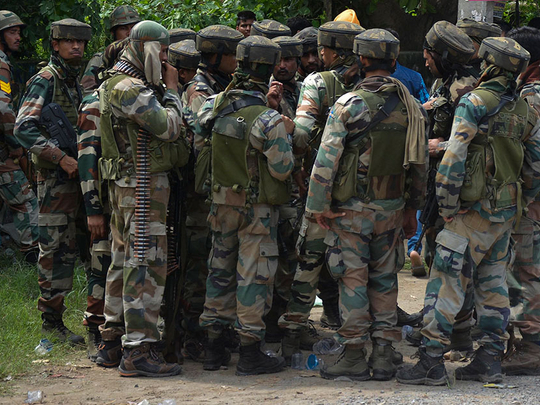
Dinanagar: Indian police overcame a group of heavily armed men dressed in military fatigues on Monday after a 12-hour gun battle that ended in a small-town police station near the border with Pakistan, and at least nine people were killed.
Police in the frontier state of Punjab killed three unidentified assailants who had pulled up at the police complex in a stolen car, automatic weapons blazing, at about 5 a.m. (2330 GMT Sunday).
Indian Prime Minister Narendra Modi and his top ministers have not made detailed statements on the attack, which is certain to raise tensions with Pakistan if it is proven to have originated across the border.
The gunmen shot dead a barber and tried to hijack a bus before rushing the police station, witnesses said. Shoe shop owner Amit Sharma, 43, was woken by the sound of gunfire at dawn.
"I thought someone was setting off firecrackers," Sharma told Reuters. Instead, he saw three men with assault rifles "spraying bullets everywhere." Throughout the day, regular bouts of small arms fire echoed across the town of Dinanagar and the paddy fields surrounding it, some 15 km (10 miles) from the international border, Reuters witnesses said.
Three policemen and three civilians were killed, according to the home ministry.
The siege focused on an abandoned building where the attackers holed up. It dragged on because security forces had wanted to capture at least one of the militants alive, a senior government source said.
Police sources added that the attackers entered India from Pakistan two days ago a short distance to the north in the state of Jammu and Kashmir, where separatist guerrillas are seeking independence from India.
Jitendra Singh, a junior minister in Modi's office, said he did not rule out Pakistan's involvement.
"There have also been earlier reports of Pakistan infiltration and cross-border mischief in this area," said Singh, whose constituency in the Jammu region borders Gurdaspur.
Kashmiri separatist leader Syed Salahuddin, who is based in Pakistan, denied his men were involved in the attack. "They are not Kashmiris ... According to my information definitely not... They could be home-grown militants," he told Reuters by telephone.
Attacks on security installations by militants dressed as soldiers or police are common in Jammu, but Monday's was the first such assault in Punjab in 13 years, according to data from the South Asia Terrorism Portal, which tracks militant violence.
Nuclear-armed rivals India and Pakistan have fought three wars since both nations gained independence in 1947. Pakistan has denied any involvement in insurgencies in Punjab and Jammu and Kashmir, and Islamabad's foreign office said it was not aware of any reports that the people involved in Monday's attack were Pakistani.
India's Federal Home Minister Rajnath Singh said he had spoken to the head of India's Border Security Force and "instructed him to step up the vigil" on the border.
Five bombs were also found on a railway track in the state, in a possible sign of an attempted coordinated attack. The group of attackers came in a white Maruti-Suzuki car they had stolen at gunpoint, a local politician told Reuters.
The car was abandoned next to the police station with its windshield peppered with bullet holes, and broken glass and bullet casings on the passenger seat.
Three wars
Pakistan, which has fought three wars with India since both nations gained independence in 1947, has denied any involvement in insurgencies in Punjab and Jammu and Kashmir.
Federal Home Minister Rajnath Singh said he had spoken to the head of India's Border Security Force and "instructed him to step up the vigil" on the border.
"The situation is under control," Singh told reporters.
Five bombs were also found on a railway track in the state, suggesting a attempted coordinated attack, around the time India is marking the anniversary of a near-war with Pakistan in northern Kashmir in 1999.
The dead included four civilians and two policemen, said H.S. Dhillon, a senior Punjab police officer. Some others were injured, he said.
The group of about five attackers came in a white Maruti-Suzuki car, dressed in army uniforms, said Harcharan Bains, an adviser to Punjab's chief minister. The attackers took the vehicle at gunpoint from a roadside "dhaba" restaurant, another local politician told Reuters.
Television footage showed a white Maruti-Suzuki sedan with its windshield peppered with bullet holes, and broken glass and bullet casings on the passenger seat. What appeared to be improvised explosive devices on railway tracks were also shown.
Deadly insurgency
India fought a deadly Sikh insurgency in Punjab in the 1980s that peaked with the assassination of Prime Minister Indira Gandhi at the hands of her Sikh bodyguards in 1984.
The attack was in retaliation to her decision to order the army to flush out militants from the Golden Temple in Amritsar, the holiest shrine of the Sikh community.
Sikh militant groups were demanding an independent homeland for minority Sikhs at the time, which they called Khalistan.
"This is probably linked to the movement of the 1990s, these are the Khalistanis who have done this. The remnants of that movement are still being hosted and protected in Pakistan. That is who I assume would be behind it eventually. Directions would have come from there," said Ajai Sahni, executive director of the Institute for Conflict Management in New Delhi.












